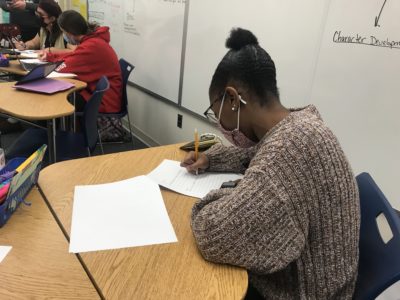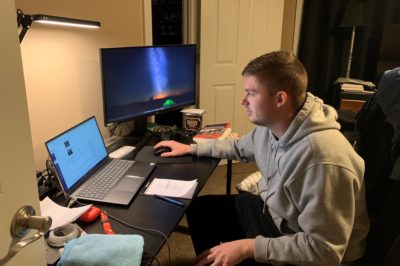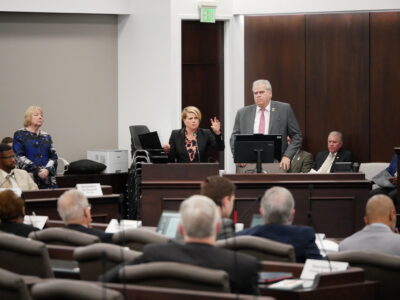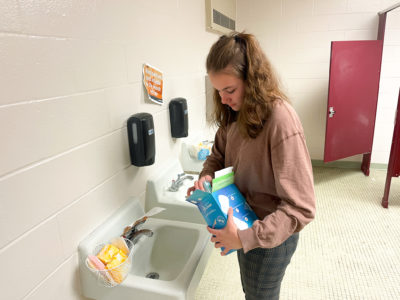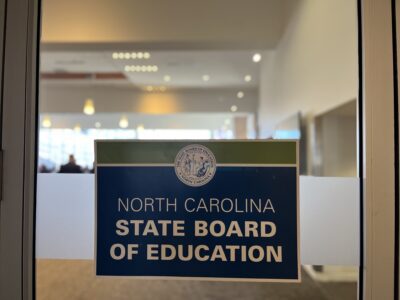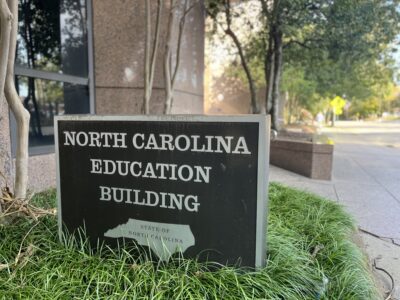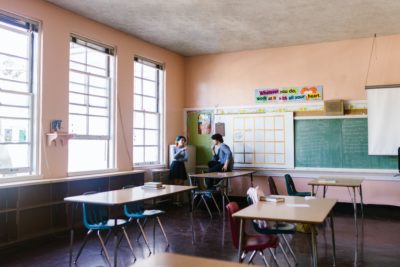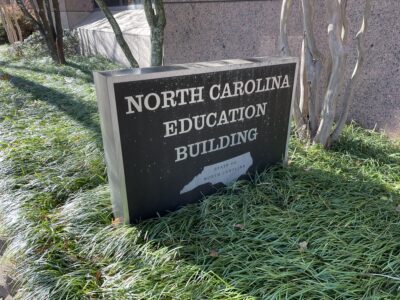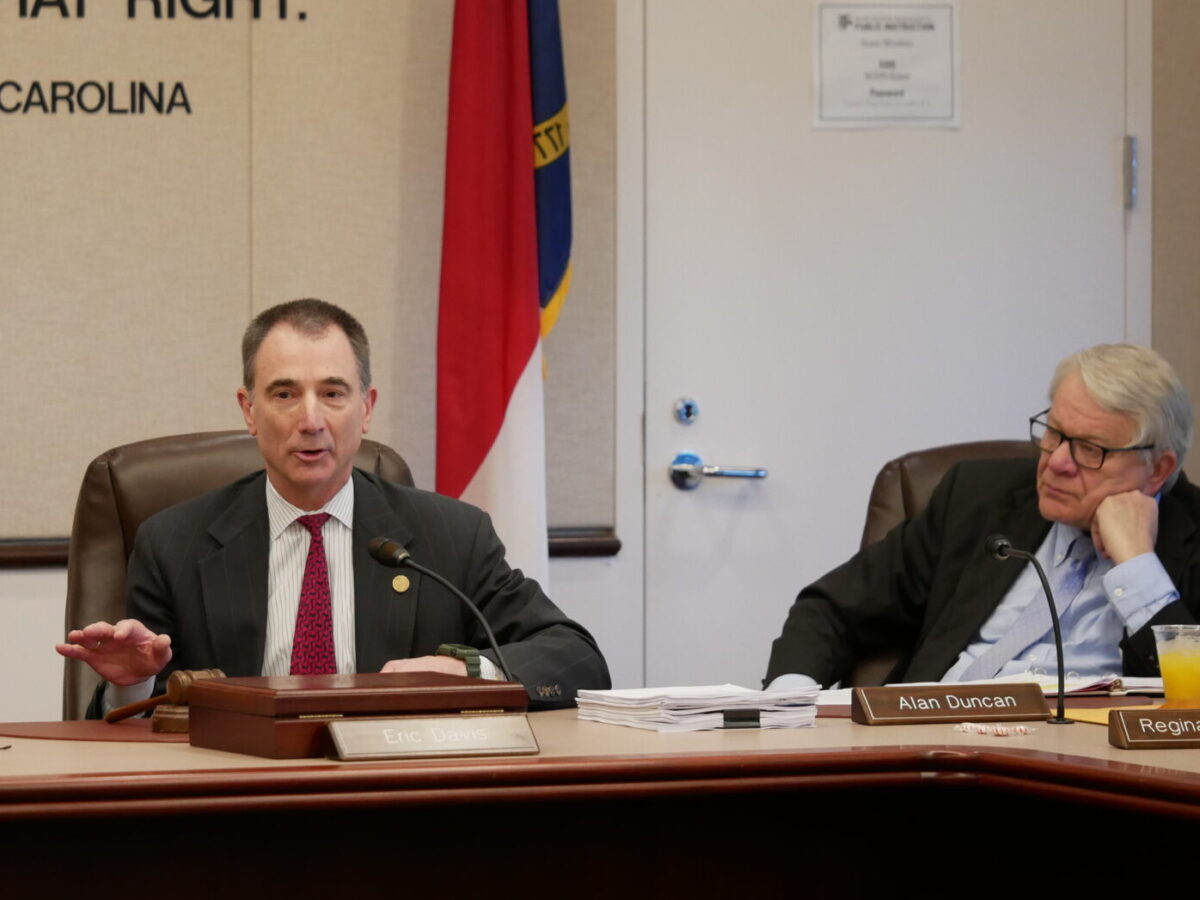

|
|
Fifty-five educator preparation programs (EPPs) in North Carolina enrolled a total of 15,865 candidates pursuing initial teaching licenses in 2022-23, according to data presented at the State Board of Education’s March meeting. Those numbers reflect a 10% decrease from 2021-22, and a 43% increase over the last decade.
However, new enrollment at programs continued to decrease, down nearly 13% from 2021-22. This is in addition to a 39% decrease in 2021-22 from the year before, when COVID waivers for tuition were in place.
In 2022-23, 5,020 candidates entered the EPP pipeline, down from 5,763 candidates the year before.
“It is the 2024-25 school year that this enrollment is going to have the greatest impact, and we’re going to feel that impact,” Tom Tomberlin, the senior director of educator preparation, licensure, and performance at the state Department of Public Instruction (DPI), told the Board last year. “It is important that we say this to the Board and in a public forum because the districts need to be aware that in the 2024-25 school year, the availability of traditionally prepared teachers is going to be lower than they’ve seen in the past.”
Trends regarding EPPs provide an important look at the health of North Carolina’s teacher pipeline. EPP enrollment includes students seeking an undergraduate degree in teaching, master’s students going after an initial license, or people seeking to become teachers through the residency route.
On Wednesday morning, State Board Chair Eric Davis spoke about the role that strong schools — and teacher pipelines — play in the state’s economic strength. Meeting the state’s workforce and attainment goals will require increased investments in students, teachers, and schools, he said.
“If you care about the next generation of North Carolinians, you will support investing in them. … We all need state leaders who strongly believe in us and our communities, and in the vital role that our public schools play in healthy, vibrant communities,” Davis said. “And of all the investments, having a great teacher in every classroom is vital to the health of our public schools, our public school students, and our society as a whole.”
According to a 2019 research brief by the Education Policy Initiative at Carolina, the UNC System, made up of 16 universities, is the state’s largest supplier of public school teachers. However, the number of students enrolled in a bachelor’s program in education has been shrinking in recent years.
In 2022, more candidates took alternate routes to licensure than traditional, such as residency programs and lateral entry. Overall, traditional enrollments were down 44% in 2022, while alternative enrollments were up 14%.
That trend held true in 2023. There were 2,686 first-year students taking alternate routes, and 2,334 taking traditional ones.
Here’s a look at 10-year trends shared with the board on Wednesday. You can look at all the EPP data on DPI’s website.
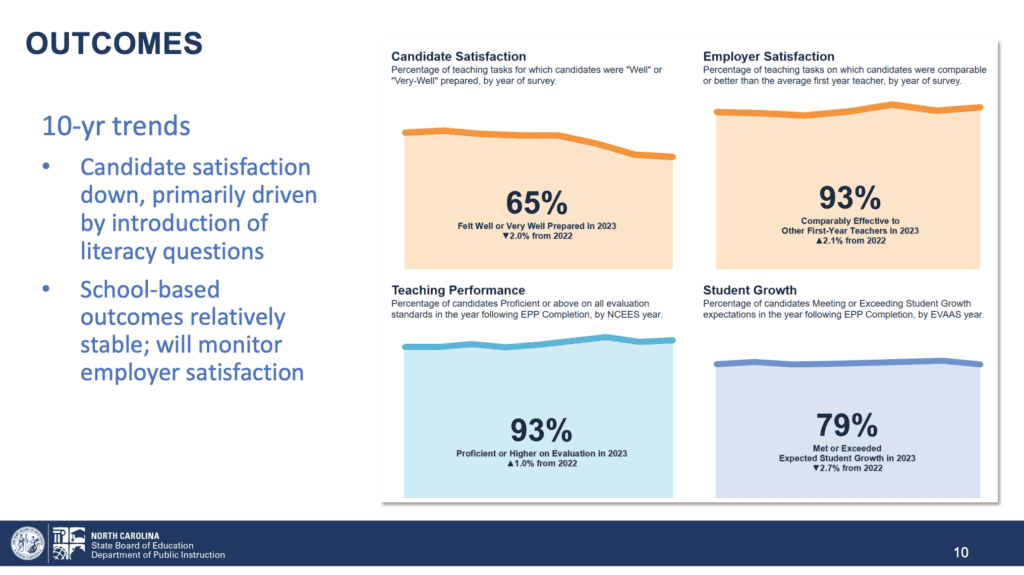

It was a packed meeting this week, featuring an appearance from Gov. Roy Cooper. Read more below.
‘Promising practices’
Board members heard several other updates regarding teacher preparation, retention, and pipelines.
First, the Board heard about three “promising practices” around the state.
Edgecombe Early College High School Principal Matt Bristow-Smith spoke about the Scholar Teachers Program, which provides Edgecombe high school students interested in becoming Edgecombe teachers with an advanced preparatory program.
The program recruits and trains high school students interested in teaching and gives them a scholarship in college if they commit to returning to Edgecombe County to teach. The district started the program to combat a 20% teacher turnover rate.
“Starting with the premise that great teachers make a difference, we began a program called the Scholar Teachers program,” Bristow-Smith told the Board. “Great teachers are the most important school-based factor in whether or not students learn.”
East Forsyth High School teacher Stephanie Wallace shared about the N.C. Teacher Cadet program in Forsyth County. The statewide program was founded in 1997 to be “an in-state teacher recruitment and leadership program designed to create a pipeline of students to be the next generation of teachers.”
Wallace is a teacher within the program in Winston-Salem/Forsyth County Schools. Since 2022, the district has served 229 students in the N.C. Teacher Cadet program.
“The Teacher Cadet program is a core strategy in WS/FCS for recruiting, developing, and inspiring the next generation of teachers,” Wallace’s presentation said.
Finally, Bertie County Schools Superintendent Dr. Otis Smallwood spoke about the system’s efforts to provide affordable housing for teachers.
The initiative, Dream Pointe Apartments, originated in 2019 with the goal of retaining teachers in Bertie County. The apartment complex includes three apartment buildings and a total of 24 units. The cost is $800 a month.
Read more
The complex was built on six acres owned by Partners for Bertie County Public Schools Foundation (PBCPSF). Smallwood said the project only used three acres, so there is room for expansion.
“The district will continue to maintain relationships and communication among the stakeholder groups that have invested their time, funding, and energy into this worthy initiative,” Smallwood’s presentation said. “District Human Resources personnel will reference this attractive option as leverage when recruiting teachers to Bertie County Schools.”
According to a January tweet from the school district, “the highly anticipated Dream Point Apartment Complex is in its final stages of construction, and soon it will be ready to welcome residents.”
In its consent agenda, the Board also voted to give initial authorization to six new community college EPP programs at Cape Fear, James Sprunt, Sandhills, South Piedmont, Guilford Technical, and Rowan-Cabarrus community colleges.
The Board also approved a report to the General Assembly on the Consolidated Teacher Bonus Program, which awards bonuses to teachers of advanced courses based on the number of qualifying scores their students earn on final exams.
In May 2023, according to the report, “of the 408 respondents, 35% (141) said the credential bonus payment influenced their decision to remain in the teaching profession. In the prior year, 38% responded favorably to this question.”
The Board is expected to review teacher attrition data next month.
Discussions on school funding
The Board also approved two important reports on school funding.
First, the Board heard an update on a funding in arrears model.
A provision in the new budget instructed DPI to develop a funding in arrears model, which means public school funding would be based on the actual average daily membership (ADM) from the prior school year, instead of projections for the upcoming school year.
Under the proposal, DPI would have to distribute funding in arrears starting with the 2024-25 school year.
“The Department shall provide funds from the ADM Contingency Reserve to fund public school units whose actual ADM for the current school year is higher than the actual ADM from the prior school year,” the budget says.
DPI Chief Financial Officer Alexis Schauss updated the Board on the department’s progress. You can view her full presentation here.
Schauss said the following challenges motivated the switch to a funding in arrears model:
- Inconsistent treatment of Public School Units (PSUs) regarding funding.
- Late budget adjustments. PSUs do not know their final funding until November/December of the current year. This creates uncertainty when recruiting staff and budgeting.
- Projections have become more uncertain since the increase in school choice and post pandemic, resulting in more adjustments.
- Charter schools are an increasing percentage of the state’s public school fund (SPSF) and has outgrown the current model.
- Administration of the SPSF is complex and burdensome.
“Allotted ADM is the backbone of the State Public School Fund and the driver of individual public school unit local, state and federal budget,” Schauss’ presentation says. “It affects the budgeting of everything in the public school — student school assignment, capital projects, the number of teachers, instructional support, teacher assistants and other personnel needed, bus routes and instructional resources.”
Here is a look at how DPI’s proposed model compares to the current one.
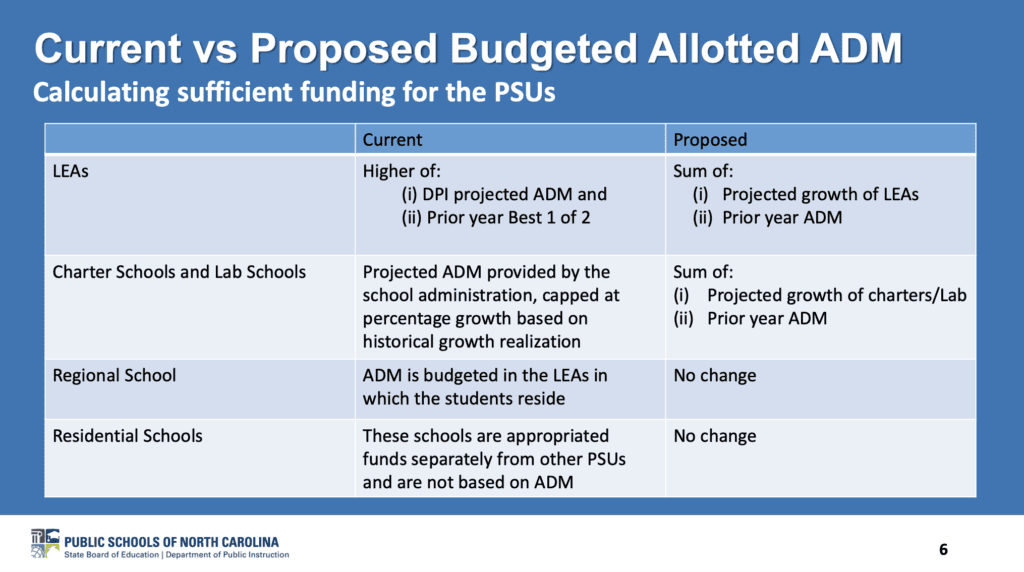

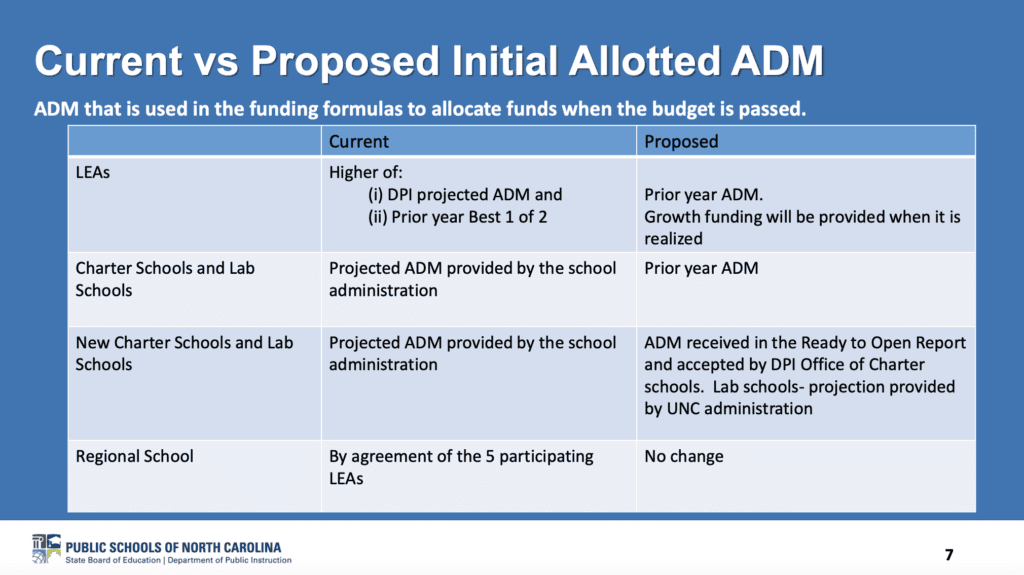

Schauss said the primary benefit of this model is that school districts would now know in October the minimum ADM they will receive funding for.
Board members said this model is expected to benefit rural districts not seeing growth. Schauss said that of North Carolina’s 115 districts, roughly 70-75 districts are declining.
DPI is not recommending the following allotment categories to be funded in arrears:
- Exceptional Children Funds
- Limited English Proficient funds
- Driver Education Funds
- School Technology Funds
- Grants
Board Vice Chair Alan Duncan said this discussion is very important to our schools.
“This is a distribution of a lot of money. … It represents a little bit of a change, and some people will be happy about the change and inevitably some people will not,” he said. “Throughout the presentation, the effort is to be equitable, you just might not feel it this specific year, it may be the following year that you have an increase or a decrease.”
The Board also heard a report to the General Assembly on a Weighted Funding for Exceptional Children Students.
The budget also directed DPI to study and create a weighted model for Exceptional Children (EC) students. The model should fund children “on the basis of the reported cost of services provided.” The budget required DPI to report back to lawmakers by Jan. 15, 2024 with such a model, along with a comparison to funds under the existing model.
According to DPI, a weighted model will “generate varied funding based on the weights applied to the service level categories rather than a fixed level per student.” It will also “generate funding and a distribution of that funding to more closely align with the students and their service delivery needs.”
You can view DPI’s full presentation, including the proposed model’s funding requirements, here.
Moving forward, DPI will work with school districts to see how funding would be generated under the model, and “run the model against actual expenditures data to see how it fairs in covering real and projected costs.”
“This is a really positive step for our children that so much deserve our attention,” Duncan said.
‘Protect Our Students Act,’ charter school renewal, and feminine hygiene products
The Board continued to discuss implementation of laws passed last law session, including S.L. 2023-128, “an act to modify penalties and definitions for certain sex offenses against students, (and) to increase the penalties for the failure of school administrators to report certain misconduct to the State Board of Education.”
The law also requires the Center for Safer Schools to produce and distribute an age-appropriate video for sixth-12th graders to identify acceptable and unacceptable student-teacher interactions. The law elevates sexual misconduct with a student to a Class G felony, and an administrator’s failure to report sexual misconduct to the State Board of Education within five days as a Class I felony.
The bill, called the “Protect Our Students Act,” was championed by Superintendent Catherine Truitt.
“We know the overwhelming majority of educators will never come anywhere close to violating the rights of students,” Truitt said in October. “However, I firmly believe that one instance of sexual misconduct is too many. This legislation protects and informs students, while outlining and increasing the penalties for offenders. We know school safety is top of mind for so many across the state. This is another important step to prioritize student well-being in school.”
Between January 2016 and October 2022, there were “124 instances of sexual misconduct by educators involving students resulting in a license suspension, revocation or voluntary surrender,” according to DPI.
On Thursday, the Board approved final temporary rules on the Board’s standards of professional conduct policies.
The law gives the State Board “authority to adopt temporary rules to implement the requirements of the legislation, to address disciplinary action against professional educator licenses, and to modify the Standards of Professional Conduct.”
DPI’s recommended changes include amendments to two existing rules, a repeal of five existing rules, and the adoption of six new rules. According to DPI’s presentation, the rules will take place April 8, 2024 or earlier.
In addition to some clarifying language, those changes include:
- Adding the “intentional or reckless exposure of students to profane, vulgar, or sexually explicit material except as part of age-appropriate classroom instruction or other pedagogical practice” to prohibited educator conduct “toward or in the presence of a student.”
- Clarifying that solicitation or encouragement of a romantic or sexual relationship is prohibited in any form (written, verbal, or physical).
- Clarifying that the revocation or suspension of an educator license or other occupational license in North Carolina or another state can be grounds for disciplinary action against a license.
- Interpreting and clarifying scope of reporting requirements to include: Convictions and charges for crimes listed in G.S. 115C-270.35, conduct involving physical or sexual abuse of a child or student, and defines “determination of disciplinary action” to include suspension with or without pay.
You can read the full updated rules here.
The Board discussed several other budget items during its meeting.
Following legislative changes included in the budget, the Board has been working to update its policy on charter renewals. On Jan. 22, representatives from both the State Board of Education and the Charter Schools Review Board (CSRB) met to work toward a solution.
John Blackburn, Board member and chair of the Education Innovation and Charter Schools Committee, said again that the committee is still working on a revised amendment soon. The committee plans to bring that amendment to the Board for a vote in April, Blackburn said.
You can read the most updated draft amendment language from last month here.
As part of its consent agenda, the Board also approved a report to the General Assembly on the Feminine Hygiene Products Grant Program.
The new budget allocated $250,000 each year of the biennium to provide additional funds for feminine hygiene products for students. The revised appropriation is now $500,000 each year.
According to the report, DPI’s N.C. Healthy Schools Section of the Office of Academic Standards provided an application to all school districts “to apply on a first come, first-served basis for the Feminine Hygiene Products Grant Program for funding of up to $5,000 to purchase feminine hygiene products.”
DPI received 149 applications, with funding requesting ranging from $300 to $500. Per the report, DPI “was able to award a total of 64 PSUs (Public School Units) with a Feminine Hygiene Products Grant,” based on the original $250,000 state allocation.
The grant awardees indicated that they would use the funding to purchase products ranging from tampons and pads to underwear and educational materials on puberty. The PSUs also noted that the grants would provide much needed support for students to stay in school during the time of their menstrual cycle; ensure students can maintain good hygiene and reduce unnecessary infections; make products more accessible to students with transportation constraints; provide feminine hygiene supplies for those who cannot afford the expensive products, especially those in rural and low-income areas; reduce embarrassment associated with menstruation and not having necessary supplies; and offset teacher and support staff expenses for such products.
Many awardees indicated that some students rely on their school to provide the feminine hygiene products they need, as their families may not have the financial means to purchase the products. Awardees also noted the toll on student mental health that not having access to feminine hygiene products can have, and how that correlates to increased time out of school.
Excerpt from DPI report on the Feminine Hygiene Products Grant Program
The Board approved technical and legal clarifications on its policy amendment, Accelerated Pathway for Early Graduation in Three Years.
Among other things, those changes clarify that charter and regional schools can offer an accelerated pathway.
You can view that updated document here.
Finally, the Board also approved several grant funds, listed below.
- The American Rescue Plan (ARP) ESSER III budget proposals, which details requests for unobligated funds as of March 2024. The document also requests a nearly $1.2 million transfer of “restricted unobligated afterschool math program funds to afterschool Robotics Program to meet he unmet requests of this program.”
- The Extended Learning and Integrated Student Supports Competitive Grant Program (ELISS) Recommendations for Funding. The purpose of the program “is to fund high-quality, independently validated extended learning and integrated student support service programs for at-risk students that raise standards for student academic outcomes,” DPI’s agenda says. The Board received 34 applications for the program, and will fund 15 applications, serving a total of 13,193 students.
- The 2023-24 Plasma Games Grant Award Recommendations. Those funds are meant to provide educational software for science, technology, engineering, and math (STEM) and career and technical education (CTE) courses. DPI received 29 applications totaling $1.3 million in requests, which the Board voted to fund on Thursday.
- The Career and Technical Education (CTE) Grade Expansion Program Grant Application Recommendations. That grant is meant to expand CTE programs by prioritizing the inclusion of sixth-seventh grade students, DPI’s agenda says, “through grant awards provided to selected local school administrative units and charter schools for up to seven years.” You can view the funds awarded for the 2023-24 grant cycle — totaling nearly $845,000 — here.
The full Board meets next April 3-4.
New CIHS programs, paid parental leave, AI, and more
- The Board approved two new Cooperative Innovative High School Program (CIHS) applications for the 2024-25 school year: Dare County Early College High School and Rockingham County CTE Innovation High School. The schools reflect the first CIHS program in Dare County and the second in Rockingham, respectively.
- The Board also approved its annual report to the General Assembly on the Career and College Promise and Cooperative Innovative High School Programs, which it discussed last month. You can view that report here.
- In August, the Board approved a paid parental leave policy that allots up to eight weeks of parental leave for the parent who gives birth, and up to four weeks for other parents, including foster and adoptive parents and legal guardians. On Thursday, the Board discussed changes to that policy, including establishing rules for miscarriages and stillbirths. That policy is set for a vote at the Board’s next meeting.
- DPI presented on its guide of resources and best practices for using Artificial Intelligence (AI) in PreK-12 environments.
- The Board heard an update on the North Carolina Governor’s School, a four-week summer residential program for gifted and talented high school students, held at two campuses in the state. More than 40,000 students have attended since 1963, according to DPI data, with 800 students expected to attend this summer. N.C. Teacher of the Year Kim Jones shared the impact Governor’s School had on her life. The program is continuing to expand access and opportunity, including racial and geographic representation.
- The Board approved the 2022-2023 Consolidated Data Report, discussed at last month’s meeting. You can read about state data on suspensions, expulsions, dropouts, and more on EdNC’s website.
- Finally, the Board adopted the Final Temporary Rules on Interscholastic Athletics in response to state law passed last fall. “These rules address such topics as the administration of interscholastic athletics, student health and safety, student participation requirements, amateur rules, penalties, and the appeals process,” per DPI’s agenda. You can view a summary of those changes here, and the policy here.





